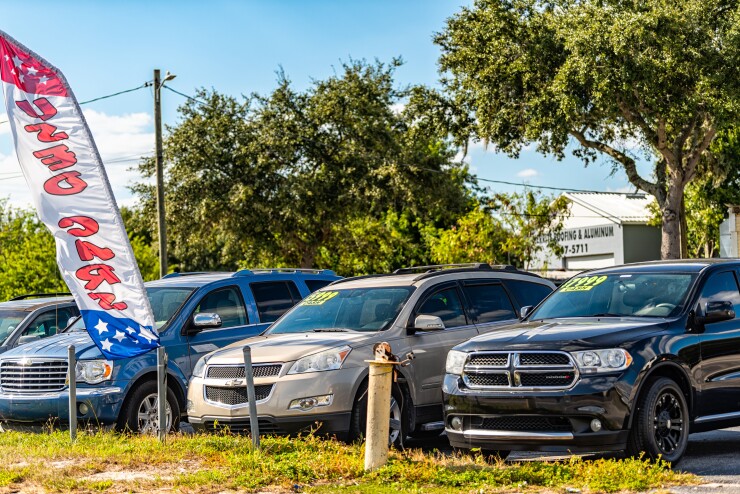U.S. banks extended substantially more credit in the second quarter, with one notable exception: auto loans.
Growth in lending to consumers buying cars and trucks in the second quarter decelerated to half the pace of the prior three months as rising interest rates and high costs called into question borrowers' ability to repay.
The U.S. economy shrank slightly in the first half of 2022, slowed down by
At the same time, as several bankers said during second-quarter earnings season, credit unions ramped up in the auto space, offering below-market interest rates in an effort to gain share. Bankers said they could not compete with the aggressive pricing, adding another reason for caution in the auto arena.
"These
The $440 billion-asset Capital One, of McLean, Virginia, is the nation's leading car and truck lender. But its second-quarter auto loan originations declined 12% from the prior quarter.
Fairbank said auto loan charge-offs remain low and overall credit quality is strong. But he also noted that a big factor in auto lending — the value of cars and trucks — is tenuous. One appeal of auto lending is that, in the event a borrower fails to repay a loan, lenders can repossess and resell the vehicle, minimizing or avoiding losses.
With used-car prices rising this year, some lenders still see relative safety in the auto business. But Fairbank said supply-chain issues will eventually get resolved, auto manufacturing will rebound, and used-car values may fall. This would weaken the collateral positions that lenders are taking on with loans this year, representing future risk of losses.

"We hear and we see the yellow lights flashing too," Ally Financial CEO Jeffrey Brown said during the $186 billion-asset company's
Second-quarter auto loans across the U.S. banking industry grew just 0.7% from the prior quarter, to $548.89 billion, according to S&P Global Market Intelligence data. The rate of growth was half that of the 1.4% expansion in the prior quarter. Credit unions, meanwhile, grew auto loans at a 3.5% rate in the first quarter, S&P data shows. Second-quarter data for credit unions was not yet available.
U.S.
"The only category shrinking is auto," said Brian Foran, an analyst at Autonomous Research.
Lawrence White, an economist at New York University's Stern School of Business, said banks are more conservative now than they were in the run-up to past recessions — largely the result of the staggering losses they absorbed amid the fallout of the 2008 financial crisis.
"There were a lot of lessons learned and a lot of mistakes nobody wants to repeat," White said. He suspects banks will grow increasingly cautious about lending as 2022 wears on, particularly if the economy continues to contract in the second half of the year.
Early hints of concern in consumer lending will gradually expand to multiple business lines, White predicts.
Meanwhile, auto lending is holding the spotlight. The banking industry's overall auto loan delinquency ratio increased to 2.18% in the second quarter, from 1.92% the previous quarter, according to S&P Global.
The $541 billion-asset PNC Financial Services in Pittsburgh said its second-quarter auto loans declined 4% from the prior quarter. PNC Chairman and CEO William Demchak said the bank does not want to get caught chasing low-quality loans.
"Auto lending seems, in our view, to be a little bit of a bubble" at risk of popping, Demchak said on the company's earnings call last month.






